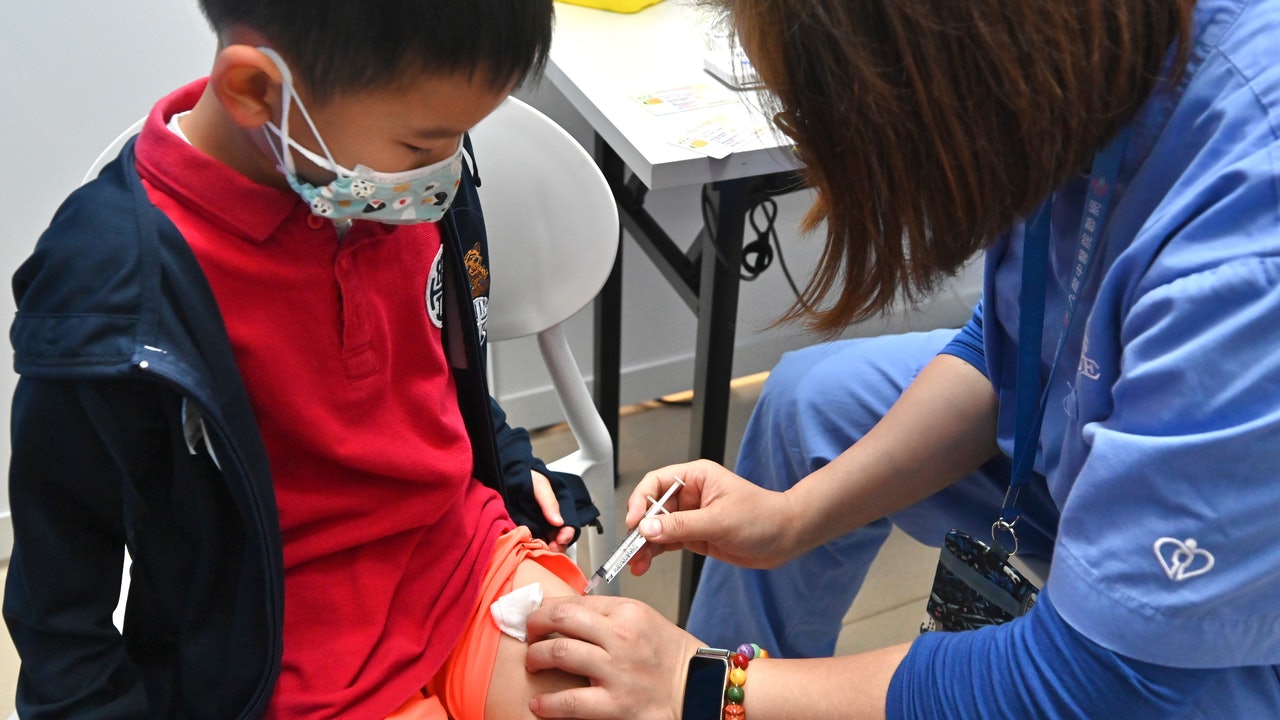Since the outbreak of the fifth wave of the epidemic on January 23, as of yesterday (February 24), a total of 84,000 new confirmed cases were reported, among which more than 10,000 children under the age of 19 were infected, and 4 of them died.
Liang Zhuowei, a government expert consultant and Dean of the Faculty of Medicine of the University of Hong Kong, called for raising the vaccination rate of children to more than 90% in the next two months; "Hong Kong 01" is based on the average rate of 10,000 children being vaccinated every day in the past 10 days. The goal is not difficult to achieve.
However, the current epidemic situation is severe, and there is still considerable risk for 200,000 children under the age of 3 who cannot be vaccinated, and 400,000 children aged 3-11 who have not been vaccinated. Is it feasible to shorten the vaccination target to within one month or even within two weeks?
The current epidemic is severe, and there are still considerable risks for 200,000 children under the age of 3 who cannot be vaccinated, and 400,000 children aged 3-11 who have not yet been vaccinated.
(file picture)
In the past 10 days, an average of 10,000 children received injections every day
The higher infection rates among children are not unrelated to their lower vaccination rates.
The fifth wave of the epidemic has shown signs of outbreak since the end of last year, but the authorities have only allowed children aged 5-11 to be vaccinated with Sinovac vaccine since January 21 this year. Under the circumstance that parents generally have strong "vaccine hesitancy", even if the vaccination is relaxed Age and vaccination ratio have not increased significantly. As of February 13, the vaccination rate of children aged 5-11 was only 6.73%, which is estimated to be about 27,000 people.
Since then, the epidemic situation has continued to heat up, and there have been widespread outbreaks among children. The SAR government has relaxed the age of children's vaccination of Kexing vaccine to 3 years old on February 15 and 16 respectively, and allowed 5-year-old children to be vaccinated with Fubitai vaccine. The vaccination rate of children aged 3-11 has increased to 24.84% as of yesterday, or a total of 131,000 people.
Comparing the data from the past 10 days and the relaxation of the vaccination age, the vaccination rate of children aged 3-11 has indeed increased. A total of 104,000 more children have been vaccinated, or an average of about 10,000 children per day.
However, the current epidemic is out of control. Today (February 25), the number of newly diagnosed cases exceeded 10,000 for the first time, setting a single-day record since the epidemic. Calculated according to the proportion of children diagnosed since the fifth wave of the outbreak - among the 84,000 confirmed cases, there are at least 13,000 children under the age of 19, that is, the proportion of children diagnosed is 15%, then if there are at least 10,000 children diagnosed every day 1,500 children have been diagnosed with the virus - this is still a considerable risk for children,
especially about 200,000 infants and young children under the age of 3 who cannot be vaccinated at all, but cannot avoid family transmission .
Liang Zhuowei recently called for the need to increase the vaccination rate of children to more than 90% in the next two months in order to form a certain degree of protection.
According to the data of the new coronavirus epidemic special website, there are still about 400,000 children aged 3-11 who have not yet received their first injection. To achieve the 90% vaccination target proposed by Liang Zhuowei, the average daily vaccination dose for children in the next two months needs to be maintained. At 5,720 needles, according to the current vaccination capacity of at least 10,000 child needles per day in Hong Kong, it should not be difficult to complete.
The 3 community vaccination centers for children, which can only receive 2,000 doses of Fubitai each day, are fully booked until mid-to-late March.
(Photo by Liang Pengwei)
Doubling the number of children vaccinated is not infeasible
However, the current epidemic situation is severe, and the number of children with severe illness has increased sharply. The two-month vaccination time seems to be too long. If the 90% vaccination target is to be shortened to one month, the average daily child vaccination rate needs to be increased to 11,500 injections,
which is obvious .
It is also within the capability of the SAR government
- if the authorities are to be more active, for example, the Secretary for the Civil Service, Nip Takquan, predicted last Friday (February 18) that the first vaccination rate for people over 12 years old can be as soon as next week. If the authorities are determined to cover the "two-week target of ninety percent" to the population over the age of 3, that is, at least 340,000 children will be vaccinated for the first time in the next two weeks, the average daily dose will be further increased. To 24,500 needles -
whether the SAR government has this capability is one thing, and whether the SAR government has such courage is another matter.
In fact, since the SAR government has relaxed the vaccination age for children, as it has not actively mobilized the community and schools, even though it has added a number of vaccination centers dedicated to them, including one in Hong Kong, Kowloon, and the New Territories dedicated to Vaccination Children’s Community Vaccination Centres (HKU Hospital in Wong Chuk Hang, Hong Kong Children’s Hospital in Kai Tak, Yuen Chau Kok Sports Centre in Shatin), and five Student Health Service Centres of the Department of Health specializing in vaccinating children with Sinovac However, since the number of daily vaccinations is always limited, many appointments are already full until mid-to-late March, which can be described as "hard to get a shot".
From February 15th, the day when 3-year-old children are vaccinated with Kexing vaccine, you can feel the fluctuation of injection demand, because the website is quickly filled with appointments, and there are also long queues outside the vaccination center; as of now, 5 student health service centers will be available by the end of the month. There are no more places, and the three community vaccination centers for children, which can only receive 2,000 doses of Fubitai a day, are fully booked until mid-to-late March. In order to increase the vaccination capacity, for example, the Community Vaccination Center of the Kwun Chung Sports Centre in Jordan has inoculated more than 3,000 doses of vaccine since February 15, far exceeding the original daily limit of 2,300 to 2,400 doses. Incremented.
Pregnant women are vaccinated against the new crown to help reduce the risk of infection or even severe disease in their babies after birth.
(Getty)
Outreach vaccination services must be accelerated
Of course, the authorities can extend the working hours of the vaccine center. For example, the unified opening hours of the Student Health Service Center are 7 hours a day from Monday to Friday and closed on weekends. All the forces that can be mobilized should be mobilized, such as more active promotion of outreach services that arrange for doctors to go to school for vaccination, and even early arrangements for primary medical personnel to assess the physical condition of children. It is believed that it is still possible to rapidly increase the vaccination rate of children in the short term.
It is undeniable that the Government has encouraged schools to "team up" to implement outreach vaccination services, and to join students from nearby schools for injections in the same school premises. Today, Shau Kei Wan Government Primary School officially became the first government school to play a central role in outreach services. Primary school, arrange doctors and nurses to visit the school to vaccinate 170 primary school students, 90 kindergarten students, and 20 parents and staff including the primary school, the Kindergarten Department of Bishop's College, Anglican Church of the Nativity Church and Xinmiao Kindergarten vaccine.
However, some schools also reported that the administrative procedures of the Education Bureau took time. For example, Shan Wanya, the principal of Tang Ying Yip Primary School of Yuen Long Public Secondary School Alumni Association, pointed out that the school had about 300 people who were willing to be vaccinated, but had not been assigned to the school for injections. , had to contact a private medical clinic to provide outreach vaccination services for schools, and was contacting kindergartens in the same district to join.
It can be seen that,
whether it is to speed up administrative procedures or to provide various support to schools, the government still has a lot of room for efforts.
As for about 200,000 infants and young children under the age of 3, Germany's BioNTech and Pfizer announced on February 15 that the new crown vaccine jointly developed by them can be used for children aged 6 months to 4 years old, but as soon as April 2022. The results of the relevant clinical studies will be released in the coming months.
There is no vaccine for infants and young children, which does not mean that parents are completely powerless. The research results released by the world-renowned journal "JAMA" (JAMA) on February 7 show that children born to mothers who have not been vaccinated and infected with the new coronavirus Babies born to women who were vaccinated during pregnancy had longer-lasting antibody levels than babies.
A research report released by the U.S. Centers for Disease Control and Prevention (CDC) on February 15 also confirmed that vaccination of pregnant women against the new crown can help reduce the risk of infection or even severe illness in babies after birth.
However, the vaccination rate of pregnant women in Hong Kong has always been low. For example, the vaccination rate of pregnant women diagnosed in Tuen Mun Hospital is less than half, and the vaccination rate of other cluster hospitals is even as low as 20 to 30%. The authorities need to step up efforts to popularize the knowledge of the new crown among pregnant women and encourage them to get vaccinated as much as possible. Provide the best protection for the fetus and baby.








